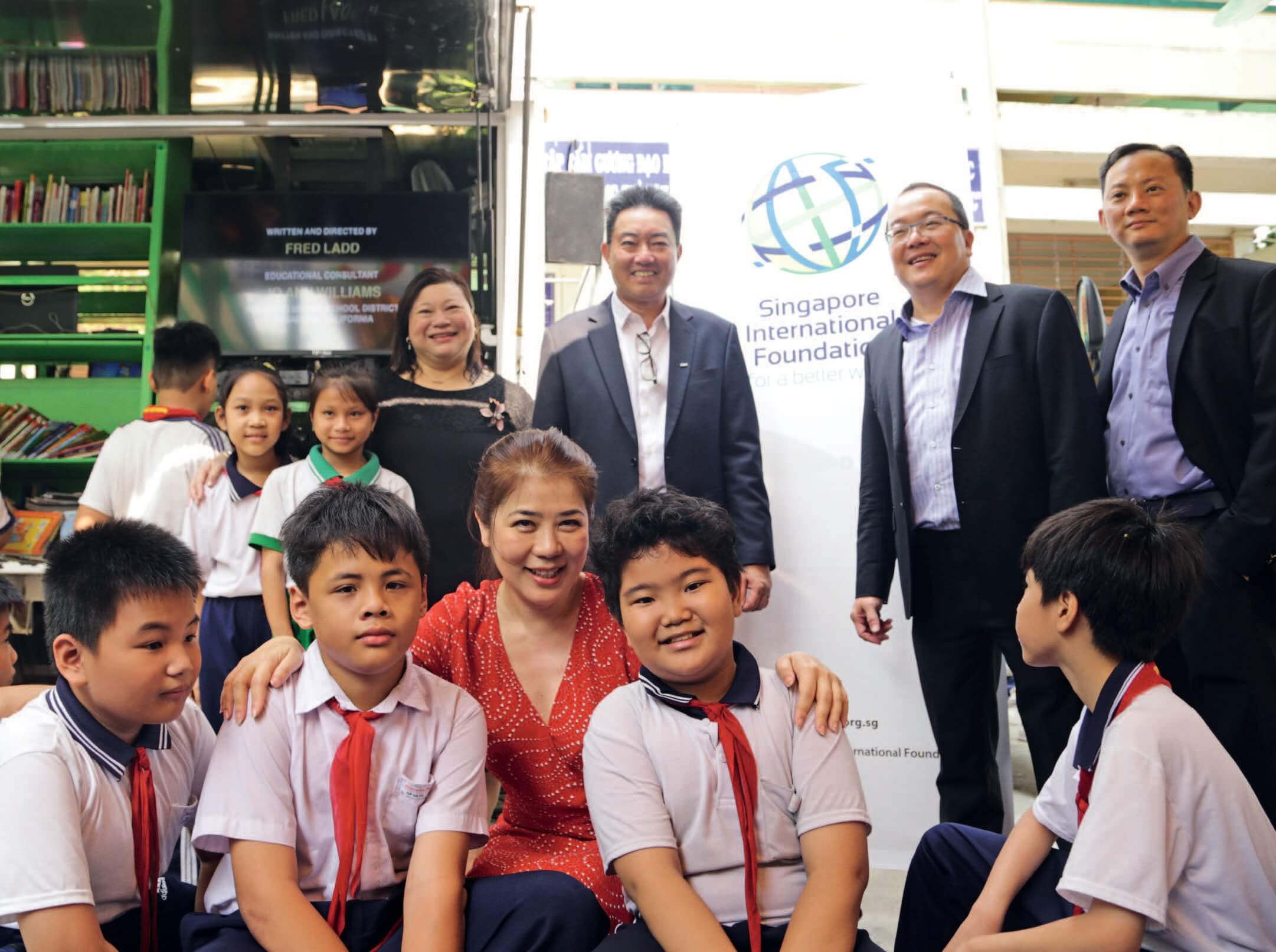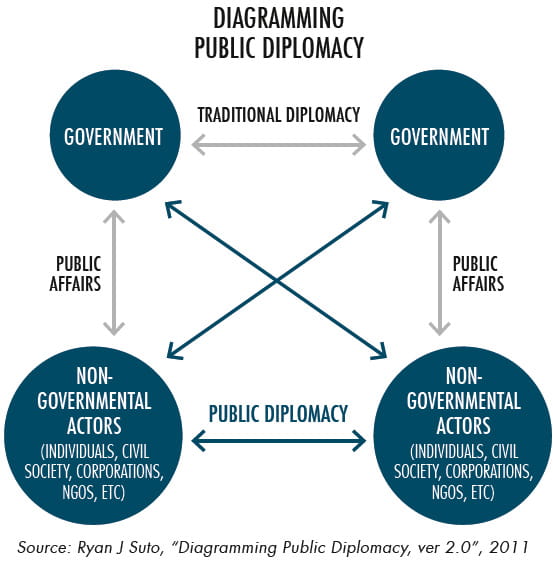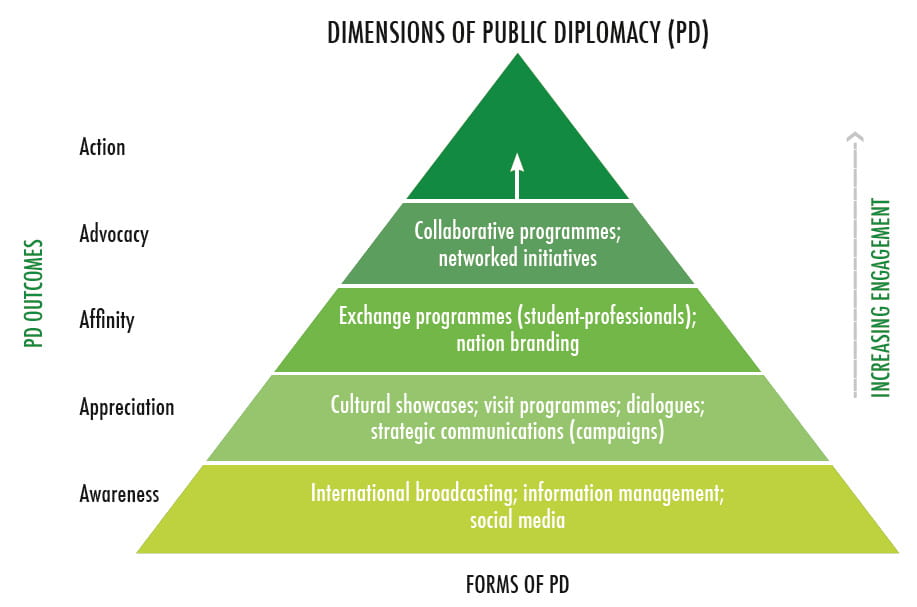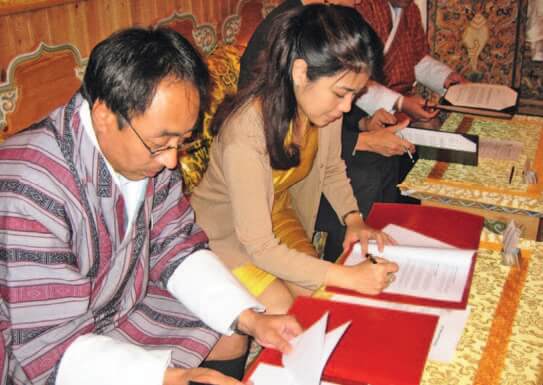Stories > Rise of the Citizen Diplomat
Rise of the Citizen Diplomat
Jean Tan, executive director of the Singapore International Foundation, highlights the growing influence wielded by non-state actors which, together with state-driven initiatives, enrich the tapestry of relations between nations.
everal useful lessons emerged from the incident that saw nine Singapore military Terrex vehicles seized by Hong Kong customs in November 2016, not least of which was an illuminating insight into new ways of practising the art of diplomacy. Taking to the video-sharing website YouTube, citizen bloggers posted tongue-in-cheek Singlish (Singaporean English) songs pleading for the return of Singapore’s Terrex vehicles. These videos went viral, and the comments they attracted reflected a wealth of perspectives from viewers across Asia.
While traditional diplomacy between governments still plays a vital role in the management of relations between nations, media-savvy citizens today connect readily online on any number of complex cross-border issues to export ideas, influence opinions and develop solutions. This forms an increasingly vibrant strand of public diplomacy by state and non-state actors, through initiatives such as mass media, people-to-people exchanges, and international cooperation programmes.

SIFʼs Words on Wheels programme sees volunteers helping children in Vietnam and Indonesia foster a love of reading through a mobile library.
PUBLIC DIPLOMACY
At its core, public diplomacy is about building awareness and appreciation of a nation’s values, culture and policies. Such interactions can help foster mutual respect and affinity through the exchange of ideas, skills and experiences. Citizen diplomacy seeks to inspire advocacy and action through collaborations that strengthen ties and trust between communities.
When individuals, academics, businesses and civil society leaders initiate discourse and action at the grassroots level, they help draw attention to issues and considerations that may not be at the top of the agenda for governments. Accordingly, states that bring their citizens into the fold are able to tap into the growing influence wielded by non-state actors. Taken together with state-driven initiatives, public diplomacy thus enriches the tapestry of relations between nations.
“Many Of Todayʼs Social, Economic And Environmental Issues Are Complex And Cut Across Continents... To Forge A Common Understanding Of Global Challenges And Foster Collaborative Problem-solving, We Believe In Strategies That Harness The Power Of Networks.”
Across the globe, nations are investing heavily in public diplomacy. The US Department of State spent the equivalent of S$2.4 billion on public diplomacy in fiscal year (FY) 2015. The annual budget of the British Council was S$1.9 billion in FY2016, while the Japan Foundation’s funding exceeded S$242 million in FY2015. China has built some 500 Confucius Institutes in 120 countries to expand its international reach, with programmes to teach the Chinese language and showcase Chinese culture. The state-supported China Central Television (CCTV) International broadcasts in seven languages around the world, largely on Chinese news, documentaries, social education, culture and entertainment.

Compared to other countries, public diplomacy is not prominent in policy deliberations in Singapore. While there are ad hoc elements, such as post-disaster relief efforts and technical aid, Singapore lacks a coherent and strategic national framework for public diplomacy. This needs to change. By constructing and conducting relations with public communities overseas, and facilitating networks between non-governmental groups at home and abroad, states can strengthen their standing with the vocal global public groups who wield increasing influence on public discourse.
In the meantime, private actors, partners and networks have stepped up to close the gap. These include citizens (youths, social and religious leaders, business professionals) and non-state actors (think tanks, community-based groups, international non-government organisations). By communicating credibly and engaging meaningfully with communities abroad, they have advanced international diplomacy practices in tandem with their own goals.
A NETWORKED WORLD
The Singapore International Foundation (SIF) is a nonprofit organisation dedicated to strengthening people-to-people relations across borders. When people from different parts of the world work together, they gain insights that bridge social and cultural divides. This sharing of ideas and resources inspires action and enables collaborations for good.
“Citizens And Communities Who Connect Across Borders Form Social Networks That Enable Us To Build A Better World. In This Way, Global Citizens Can Contribute In Meaningful Ways To Strengthening International Understanding And Development.”
Many of today’s social, economic and environmental issues are complex and cut across continents. This context demands new ways of working. To forge a common understanding of global challenges and foster collaborative problem-solving, SIF runs a number of programmes under four broad thrusts: cultural exchange, good business, volunteer cooperation and “our better world”. All these programmes are designed to connect communities, enable collaboration and effect positive change.
For instance, in its Arts for Good initiative, SIF encourages Singaporean artists to collaborate with international artists to galvanise greater community involvement in sustainable development. It also has a global network of 1,000 young social entrepreneurs who are bound by a shared vision to pioneer solutions to social problems for systemic change. A digital storytelling initiative by SIF seeks to leverage the power of digital media to connect communities and inspire collective action.

Modern public diplomacy involves both state and non-state actors engaging foreign publics using a variety of platforms.
Under its volunteer cooperation programme, skilled Singaporean volunteers work with their overseas counterparts to transfer skills, generate new knowledge and innovate. A 2016 study commissioned by SIF discovered that the unique value-add of this people-centred approach lies in the friendships that volunteers form across cultures. Skilled volunteers tend to be trusted, liked and well-motivated for effective person-to-person teaching and engagement, thus making them particularly suited for advancing development goals such as capacity-building and developing multi-stakeholder partnerships.
Researcher Benjamin Lough, who authored the study, noted: “Donors and decision-makers need to place a higher value on intangible constructs such as friendship, compassion, inclusion, enthusiasm and trust.”
As active global citizens, such change agents embody the Singapore spirit of volunteerism abroad, bridge communities through arts and culture, contribute to sustainable change through social entrepreneurship, and share powerful stories that inspire community action for good. Citizens and communities who connect across borders form social networks that enable us to build a better world. In this way, global citizens can contribute in meaningful ways to strengthening international understanding and development.

ABOUT THE AUTHOR
Jean Tan is executive director of SIF, where she is responsible for formulating the strategic direction of the Foundation, and ensuring its effective implementation.
In her spare time, Jean volunteers on the boards of the Global Public Diplomacy Network as well as SG Enable, an agency dedicated to serving persons with disabilities.
She is also active in various work groups of the International Forum on Development Service, a global network of volunteer-driven development agencies.
